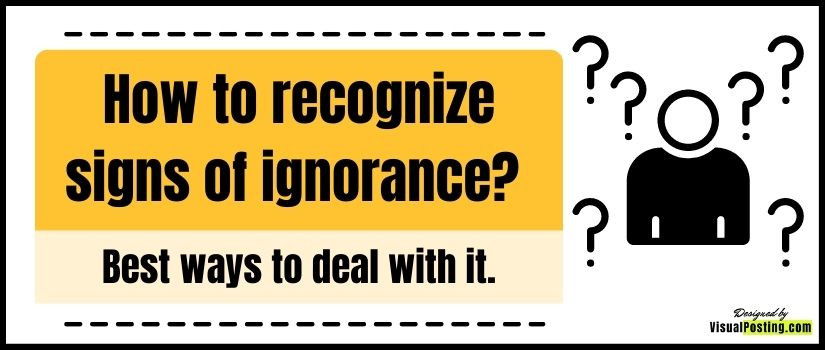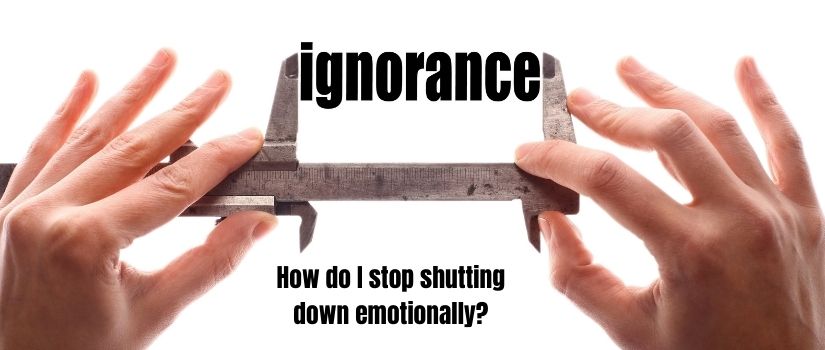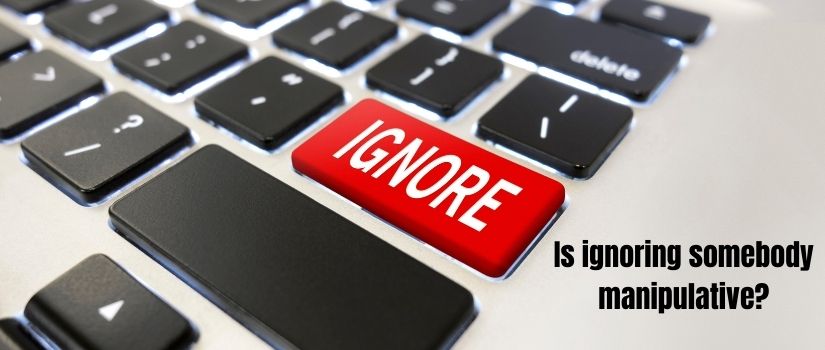
Ignorance is often used as a tool to avoid conflict and maintain peace, but its impact can be significant, especially in close relationships. When ignored, it becomes challenging to understand the other person's thoughts and feelings. While some level of ignorance can be acceptable to facilitate harmony, it should not escalate to emotional abuse.
Experiencing being ignored by someone we love is particularly painful. It hurts more than being ignored by a stranger because the person holds a special place in our hearts. Being ignored by a loved one can make even a crowded room feel like a lonely place.
Why does someone ignore you?
Their sudden silence and ignorance could stem from various reasons. Let's explore some possibilities.
1. Guilt-
When someone has wronged you, they often avoid making eye contact. They may try to ignore you or avoid being seen by you.
2. For the sake of fake attitude-
It's often observed that people pretend to be superior or better than others, which can be quite foolish. Their behavior might indicate they are tired of you or your actions. At times, people ignore you in an attempt to prompt a change in your behavior and help you realize your mistakes.
3. Lost all feelings for you-
This is one of the reasons people may ignore someone. It could be because they have lost feelings for you or no longer harbor the same affection and emotions towards you.
4. They're maybe pretending that you have been replaced by someone-
This is another deeply hurtful experience. It's when your presence is not valued, or when you feel easily replaceable by someone else.
5. Horn effect-
In human resource management, there's a term called the "horn effect," which refers to when someone judges you based on one negative action or trait. This could also be a reason why someone might ignore you.

Why is it bad to ignore your partner?
We can't always categorize ignorance as negative. Sometimes, it may be a response to the actions of another. Every relationship is unique, with its own set of rules and dynamics.
However, when ignorance turns into emotional abuse, it is undoubtedly harmful. In such cases, the affected partner should seek help or therapy. Ignoring the problem and assuming that it will resolve itself through conversation can lead to further deterioration of the relationship and understanding between partners.
“It would be too easy to say that I feel invisible. Instead, I feel painfully visible, and entirely ignored.” ― David Levithan, Every Day
Favorable ignorance-
Ignoring someone isn't always appropriate in relationships. It's important not to view situations solely through an emotional lens, as practical considerations also play a role in our decisions.
For instance, imagine you're a freelance professional with tight deadlines and long working hours. Your partner complains about not spending enough time together. While it's important to prioritize your relationship, excessive complaints may lead to understandable ignorance from your partner. Balancing work commitments and personal life can be challenging, and it's essential to find a middle ground.
Conversely, ignoring someone to feign busyness or seek attention is not acceptable. In a committed relationship, when partners need space, it's crucial to communicate openly. A strong foundation of trust and understanding allows for such conversations.
Ultimately, nurturing your relationship involves comforting your partner, ensuring their well-being, and respecting their need for independence.
“I think I owe you the time you wasted in ignoring me.” —Nitya Prakash
Let's see what we can do if someone is ignoring us.
Here are the dos and don'ts categorized into two stages for your convenience:
First stage- What you can do with themselves-
Don'ts-
1. Do not jump to argue directly-
When seeking answers, it's natural to feel frustrated, but reacting angrily is counterproductive. It can escalate the situation instead of resolving it.
2. Do not forget your limits while talking-
Another crucial point to remember is to avoid crossing the boundaries of the relationship you're in. While it's understandable to feel the urge to express your anger, it's important to be mindful of your words. A single word spoken in anger can leave lasting scars.
3. Don't let your ego stop you-
Admit it: if your ego is more important to you than any relationship, you'll struggle to maintain any meaningful connection. "Why me, always?" is a common question in relationships, but those who prioritize the relationship over their ego rarely let such thoughts disrupt their connection.
“I used to think that the worst thing in life was to end up all alone. It’s not. The worst thing in life is ending up with people who make you feel all alone.” —Robin Williams
Do's-
Gentle approach-
When someone is ignoring you, approach them with gentleness and try to engage in a peaceful conversation. A calm approach with polite words is more effective than engaging in pointless arguments.
Ask your partner why they are ignoring you and encourage them to share what's on their mind.
Try to understand their perspective and avoid overreacting.
Express how their behavior has affected you, but do so calmly and without blame.
If you both want to resolve the issue and are open to working things out, offer possible suggestions for moving forward.
“I just want to make a point that it’s not just great teachers that sometimes shape your life. Sometimes it’s the absence of great teachers that shapes your life and being ignored can be just as good for a person as being lauded.” —Julia Roberts
What to do with yourself?
Ask yourself, did you do something wrong?
We often assume we're always right, which can be a barrier to resolving issues.
Regardless of fault, take steps to improve the situation. Your partner may be waiting for you to initiate a conversation. Find ways to break the silence.
Seek advice from someone who understands you well. Their perspective can provide clarity. After considering their advice, make a decision that aligns with your relationship's best interests.
Prioritize self-respect over ego. If your ego is preventing you from reaching out, consider if it's worth sacrificing your self-respect. If you've made efforts to communicate and your partner remains unresponsive, it may be time to prioritize your well-being.
2nd stage
If you've exhausted all efforts to improve the situation and haven't received the desired response, it may be time to consider ending the relationship and focusing on yourself.
What to do with themselves
1. Acknowledge the situation: Begin by accepting the reality of the situation. Until you do so, it's challenging to move forward.
2. Forgive them: Let go of any resentment or anger towards the person who has left your life. Forgiveness can help you find peace.
3. Remove reminders: Keep away items that remind you of them. Creating distance can aid in the healing process.
What to do with yourself
1. Don't dwell on the trauma: Avoid letting a single traumatic event consume your thoughts. Acknowledge it as a part of life and work on accepting it when it comes to mind.
2. Engage in activities: Keep yourself occupied with activities that interest you. Hobbies can be a great way to distract your mind when you're feeling low.
3. Avoid feelings of unworthiness: Being ignored can sometimes lead to self-doubt. Remind yourself that you are worthy of love and respect, and don't let negative thoughts take over.

How do I stop shutting down emotionally?
It's a common experience for many of us to feel the need to disconnect from our relationships. Emotional shutdown occurs when we feel a sense of detachment or numbness. There are various reasons why someone might feel this way, such as being tired of over-possessiveness, feeling ignored, or experiencing unexpected changes in a relationship.
How can you stop it?
1. Acknowledge the disconnection. Recognize that you are feeling numb or disconnected from the relationship. Accepting this is the first step to moving forward.
2. Reflect on why you feel this way. Consider the reasons behind your emotional shutdown. Write down your thoughts and feelings to gain clarity.
3. Identify the triggering event or moment that led to this emotional state. Understand how this event impacted you and your emotions.
4. Evaluate the practicality of your emotions. Determine if your feelings are based on valid reasons or if they are disproportionate to the situation.
5. Decide the significance of the relationship or the thoughts causing the disconnect. If the emotions are valid, consider how important the relationship is to you. If they are not, focus on distracting yourself from these thoughts.
What not to do when you are numb.
1. Avoid self-judgment. Recognize that feeling numb or experiencing unusual thoughts is a normal part of the process.
2. Embrace your feelings without fear. Often, these feelings arise from overthinking. Try to take a step back and approach them with a calm mindset.
3. Avoid connecting unrelated thoughts. For example, if someone is giving you the silent treatment, it does not mean you do not deserve the relationship. Avoid mind-mapping negative thoughts.
4. Refrain from jumping to conclusions. Analyze your thoughts thoroughly before making assumptions or generalizations based on incomplete emotions.

Is ignoring somebody manipulative?
Let's first see what the signs indicate that ignorance is turning into manipulation.
1. Avoidance of communication: Your partner consistently refuses to communicate even after you initiate conversations, indicating a lack of interest in resolving issues or maintaining the relationship.
2. Seeking sympathy: They manipulate situations to gain sympathy, even when they are at fault, by making you doubt yourself or feel sorry for them.
3. Blaming you unjustly: They consistently blame you for their mistakes or make you feel responsible for issues in the relationship.
4. Aggressive behavior: Your partner responds aggressively to you, showing a lack of respect and understanding in communication.
5. Overreaction to minor issues: They blow small issues out of proportion, making you feel guilty or responsible for their exaggerated reactions.
6. Constant criticism: They frequently remind you of your flaws and shortcomings, using them against you in arguments or to manipulate your behavior.
7. Isolation: You feel consistently isolated or left out, even when you are together, as they prioritize their needs and desires over your feelings and well-being.
These are the sure signs of ignorance. They are turning into emotional manipulation.
Now, let's see why ignorance is manipulative?
1. Prolonged ignorance can severely damage a relationship, hindering further communication and connection.
2. Emotional abuse can lead to increased anxiety and stress in the victim, posing serious health risks if not addressed.
3. As ignorance transforms into manipulation, the victim may emotionally shut down, finding it difficult to trust others after such a traumatic experience.
4. The feelings of being ignored and excluded can create deep-seated insecurities, making it challenging for the individual to open up to others in the future.
5. The mental anguish caused by ignorance and manipulation can manifest as physical pain, as our brains can amplify these negative feelings, potentially leading to depression.

Why is it so painful to be ignored?
When someone we deeply care about ignores us, it can be incredibly painful. But why does it hurt so much? Let's explore some reasons:
1. It signals our lack of importance in their life - Being ignored can make us feel unimportant, especially when the person is significant to us. There could be various reasons behind their behavior.
2. It diminishes our sense of significance - The act of being ignored can lead us to believe that our presence or absence doesn't matter to them anymore, eroding our sense of importance.
3. It challenges our acceptance - We may have grown accustomed to receiving love, affection, and attention from them. When this suddenly stops, it can be challenging to accept the change.
4. It triggers feelings of unworthiness and isolation - Being ignored can make us feel unworthy and left out. Even in the presence of others, we may feel isolated as the pain cuts deep, casting doubt on our self-worth.
5. It creates a mental distance - Ignorance can create an invisible barrier in a relationship, mentally distancing us from the other person. This distance can be challenging to bridge.
6. It's difficult to process - Ignorance in an intimate relationship is unexpected and difficult to digest. It can be tough to come to terms with and even harder to overcome.
Final thoughts:
Ignorance can be more distressing than rejection or hatred, making it challenging to accept and move forward. However, it also serves as a mirror, reflecting our worth. It's crucial not to internalize it as a sign of our inadequacy. While it's important to reflect on our actions and whether they contributed to the situation, lingering self-doubt shouldn't consume us.
Instead, view ignorance as a lesson, an opportunity for growth. If despite your efforts, the relationship doesn't progress, it may be time to let go and move on.


